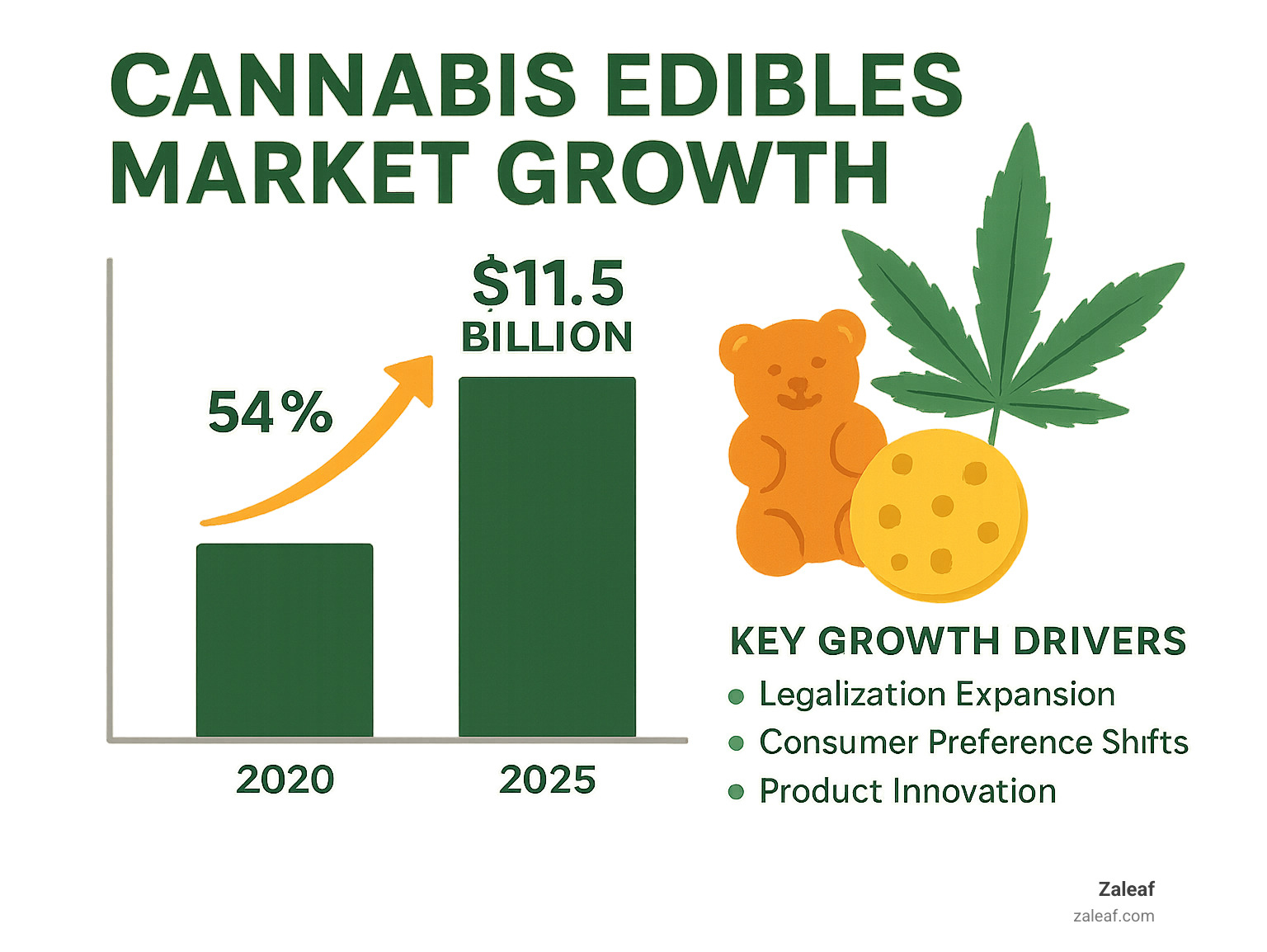The Entrepreneur's Guide: Launching Your Own Cannabis Edibles Business

The Booming Cannabis Edibles Market
Starting an edible cannabis business means tapping into a rapidly expanding market. Here's what you need to know:
Quick Start Guide:
- Plan - Create a detailed business plan and secure $6,779 to $66,832 in startup capital (average around $36,880).
- License - Obtain a Health Canada processing license (Standard or Micro-Processing).
- Comply - Hire a Quality Assurance Person (QAP) and create a Preventive Control Plan (PCP).
- Setup - Establish a commercial kitchen and source cannabis ingredients.
- Market - Steer advertising restrictions with educational content and partnerships.
The cannabis edibles market is booming. Projections show the industry reaching $11.5 billion in the next four years, with the Canadian market for extracts alone estimated at $1.6 billion annually. In 2020, the edibles market grew by 54%, outpacing other cannabis segments.
This growth creates massive opportunities for entrepreneurs who can steer the complex regulatory landscape. While it involves substantial planning and compliance, the potential rewards are equally significant.
Startup costs range from $6,779 to $66,832, with an average of $36,880. Success hinges on understanding Health Canada licensing and educating consumers on dosing and onset times.
I'm Max Shemesh from Zaleaf. My experience scaling our business has taught me that success in this industry comes from prioritizing quality, compliance, and customer education.

Must-know how to start an edible cannabis business terms:
Laying the Foundation: Your Business Plan and Funding Strategy
Your business plan is your roadmap for starting an edible cannabis business. Passion is essential, but the cannabis industry demands a methodical approach. A solid plan and funding strategy are the foundation for navigating regulatory complexities and achieving your goals.

Crafting a Winning Business Plan
Your business plan clarifies your vision, identifies potential roadblocks, and convinces investors to back you. A detailed plan is critical for securing funding and guiding sustainable growth.
- Executive Summary: Briefly summarize your company, products, market, team, and financial projections to grab investor interest. Write it last, but place it first.
- Company Overview: Define your business. Are you making artisanal chocolates or precisely-dosed gummies? Explain your mission, legal structure, and milestones.
- Industry Analysis: Show you understand the market's potential, citing the 54% growth in 2020 and the projected $11.5 billion market. This proves you've done your homework on market size, trends, and suppliers.
- Customer Analysis: Go beyond demographics. Who are you serving? Wellness-focused consumers or social users? This insight drives product development and marketing.
- Marketing Plan: Work within advertising restrictions. Focus on the four Ps: Product (what's unique), Price (your strategy), Place (distribution), and Promotion (educational content and partnerships).
- Operations Planning: Detail your day-to-day processes, from sourcing and manufacturing to quality control and distribution. Plan for both immediate needs and long-term scalability.
- Management Team: Highlight your team's relevant experience and skills. If there are gaps, consider an advisory board with industry veterans.
- Financial Projections: Provide five-year projections, including income statements, balance sheets, and cash flow statements. The cash flow statement is critical for determining your capital needs.
Your business plan is a living document; review and update it annually. For more guidance, check out the SBA's guide on writing a business plan.
Securing Capital for Your Venture
How much capital do you need to start an edible cannabis business? Startup costs typically range from $6,779 to $66,832, with an average investment of $36,880. This covers licensing, legal fees, kitchen setup, inventory, equipment, and marketing. While significant, this investment is for entry into a multi-billion dollar market.
Securing funding is challenging, as traditional banks often avoid the industry due to federal regulations. This requires creative financing solutions.
- Personal savings demonstrate commitment to investors and reduce debt. Many successful edible businesses start with founder capital.
- Angel investors and venture capital firms are increasingly interested in the cannabis space. A compelling business plan is essential to attract private investors seeking high returns.
- Specialized cannabis lenders are emerging as viable alternatives. These niche financial institutions understand the industry's unique challenges and offer legitimate financing paths.
Plan every dollar carefully, accounting for all expenses from equipment to staff. Knowing your financial needs helps you pitch investors confidently and manage cash flow effectively.
Navigating the Legal Labyrinth: Licensing and Regulations
Navigating the legal landscape is crucial when learning how to start an edible cannabis business. Understanding these regulations is about more than compliance—it's the foundation for long-term success.

In Canada, regulations exist at the federal, provincial, and municipal levels. The federal framework is set by The Cannabis Act, which covers everything from cultivation to packaging. You must comply with all tiers of regulation.
Compliance is fundamental. Working with legal professionals specializing in cannabis is a wise investment that helps avoid costly mistakes.
Understanding Canadian Licensing: Standard vs. Micro-Processing
Health Canada offers two key licenses for edible businesses: the Standard Processing Licence and the Micro-Processing Licence. Your choice will depend on your intended scale.
| Feature | Standard Processing Licence | Micro-Processing Licence |
|---|---|---|
| Production Volume | Unlimited amount of cannabis product | Up to 600 kg of dried flower (or equivalent) per year |
| Facility Size | Typically larger facilities | Smaller facilities |
| Capital Required | Generally higher due to scale | Generally lower, more accessible for smaller ventures |
| Complexity | More complex regulatory requirements and operational overhead | Slightly less complex, designed for smaller operations |
| Activities | Processing, packaging, labeling, and distribution | Processing, packaging, labeling, and distribution |
| Sales | Can sell and distribute to other licence holders or provincial/territorial retailers | Can sell and distribute to other licence holders or provincial/territorial retailers |
The Micro-Processing Licence has a 600kg annual limit on cannabis input, which is still enough to produce thousands of edible products. It's often a more manageable entry point for new entrepreneurs, with lower startup costs and less complexity.
Both licences allow sales to other licence holders and provincial retailers. The key difference is scale.
The Pillars of Compliance: QAP and Preventive Control Plan (PCP)
Two critical compliance requirements are hiring a Quality Assurance Person (QAP) and creating a Preventive Control Plan (PCP).
Your QAP is your compliance guardian, responsible for approving production procedures, ensuring product quality, and investigating any issues. This role requires significant experience in quality control, preferably in a regulated industry like food or pharmaceuticals.
Your Preventive Control Plan (PCP) is your comprehensive safety manual. It identifies and addresses biological, chemical, and physical hazards. For example, a PCP for cannabis chocolates would detail allergen controls, temperature management, and procedures for accurate THC dosing.
Regulations also require physical separation of production from any non-cannabis food manufacturing, often in separate buildings or completely isolated areas to protect product integrity.
For more details, see Health Canada's classification guide.
Essential Packaging and Labeling Rules
Canadian packaging rules for edibles are strict, designed to protect consumers and children. Key requirements include:
- Child-resistant and opaque packaging is mandatory.
- The standardized THC warning symbol and health warnings must be displayed.
- Ingredient lists and nutritional facts are required, just like regular food products.
- A strict potency limit of 10mg of THC maximum per package applies.
Labels must also include your facility information, use-by dates, and other product details. These rules protect both your customers and your business. For more on effects and dosing, read The Ultimate Guide to Cannabis Edibles: Dosage, Effects, and More.
How to Start an Edible Cannabis Business: Operations and Marketing
With the legal and financial groundwork laid, the next phase in how to start an edible cannabis business is operations and marketing. This involves setting up your production facility, sourcing quality cannabis, and creating a marketing strategy that works within strict advertising regulations.
Setting Up Your Production and Distribution
Your production facility must be a commercial space that meets rigorous health and safety standards. A commercial kitchen requires professional-grade equipment, proper ventilation, sanitation, pest control, security, and compliant waste disposal.
Source your cannabis inputs (flower, trim, concentrates) exclusively from licensed suppliers. Attending industry events is a great way to build these relationships. The quality of your source material is critical for product consistency.
For your distribution strategy, you can choose self-distribution for full control, which requires your own logistics, or use established distributors who already have the infrastructure and retailer relationships. Evaluate distributors based on their storage conditions, reach, and fees. In Canada, most sales flow through licensed dispensaries, making retailer relationships key.
For more on the craft of making edibles, our guide From Plant to Plate: Crafting Cannabis Edibles explores the artistry involved.
Marketing Your Edibles Amidst Restrictions
Marketing cannabis is challenging due to strict regulations prohibiting health claims, youth-appealing content, and most traditional ads. This requires a creative, education-focused approach to connect with consumers.
- Content Marketing and SEO: Create valuable, educational content to answer consumer questions and build trust. With cannabis information searches on the rise, good content helps you rank in search results. Guest posting on respected industry publications can also expand your reach.
- Social Media: Use platforms like Instagram for lifestyle content that showcases your brand values without direct product promotion. Focus on your commitment to quality, safety, and responsible consumption.
- Educational Content: This is essential for consumer safety and your reputation. Helping consumers understand dosing and onset times builds the trust that creates loyal customers.
For consumers seeking purchasing guidance, our guide Sweet Relief Delivered: How to Buy Cannabis Edibles Online offers valuable insights.
The Crucial Role of Consumer Education
Consumer education is a fundamental responsibility. Confusion about edibles can lead to negative experiences that harm the entire industry.
- Dosing Guidance: Always advise customers to "start low, go slow." A beginner dose of 2.5 to 5 mg of THC helps prevent overconsumption. This aligns with Canada's 10 mg THC limit per package and promotes responsible use.
- Onset Time: Explain that edibles can take 1 to 2 hours to take full effect. This prevents consumers from taking a second dose too soon. Our guide Edible Expectations: When Will Your Cannabis Snack Kick In? addresses this.
- Effects and Duration: Edibles typically produce longer-lasting, more body-focused effects. Advise consumers to plan accordingly and avoid mixing with other substances.
- Purchase Limits: Help consumers understand product equivalencies. In Canada, the daily limit is 30 grams of dried cannabis equivalent (1g dried cannabis = 15g of edibles).
To help consumers understand potency, our guide How strong is a 10 mg THC gummy compared to a joint? offers a useful comparison.
Frequently Asked Questions about Starting an Edibles Business
Here are answers to common questions entrepreneurs have about how to start an edible cannabis business.
How much does it really cost to start an edible cannabis business?
The cost to start an edible cannabis business ranges from $6,779 to $66,832, with an average of $36,880 for a well-established setup. Key expenses include:
- Licensing and legal fees: A significant upfront cost for navigating regulations.
- Commercial kitchen setup: Includes specialized equipment and meeting health standards.
- Initial inventory: Quality cannabis extracts and food-grade ingredients.
- Employee wages: Especially for a qualified Quality Assurance Person (QAP).
- Insurance: Comprehensive coverage including product liability is essential.
- Marketing and branding: Building trust through educational content.
- Technology: Including mandatory seed-to-sale tracking systems.
Always budget for unexpected costs.
Can I make cannabis edibles from my home kitchen?
No, you absolutely cannot legally manufacture commercial cannabis edibles from a home kitchen. The reasons are tied to public safety and regulatory compliance:
- Commercial kitchen requirements: Licensed facilities must meet strict standards for ventilation, sanitation, and security that home kitchens cannot.
- Cross-contamination risks: Regulators require strict separation of cannabis and non-cannabis production to prevent accidental contamination.
- Licensing and inspection: Your facility will undergo rigorous inspections to receive and maintain a processing license. A home kitchen will not pass.
Investing in or partnering with a licensed commercial kitchen is a necessary cost of doing business legally and safely.
What are the biggest challenges when learning how to start an edible cannabis business?
Starting an edibles business presents several key challenges. Understanding them upfront is crucial for success.
- Navigating Regulations: The legal landscape is complex and constantly changing across federal, provincial, and municipal levels, requiring constant vigilance.
- Securing Funding: Traditional banks are often hesitant, forcing entrepreneurs to seek private investors and specialized lenders.
- Marketing Restrictions: You must rely on creativity and educational content to build a brand, as traditional advertising is heavily restricted.
- Supply Chain Management: Finding consistent, high-quality, and compliant cannabis sources requires strong relationships with licensed cultivators.
- Intense Competition: The market is booming, so standing out requires exceptional quality, a clear brand, and a great customer experience.
- Finding Qualified Staff: It can be difficult to find employees, like a QAP, who understand both food production and cannabis regulations.
- Tax Complexities: Cannabis businesses often face unique tax burdens that require careful financial planning.
Despite these challenges, the rewards are substantial for businesses that prioritize compliance and quality.
Conclusion: Your Recipe for Success in the Edibles Industry
Starting an edible cannabis business is a significant undertaking, but it's an entry into a booming market projected to reach $11.5 billion. Now is an excellent time to get started.
This guide covered the recipe for success: a solid Business Plan, proper Licensing, compliant Production, creative Marketing, and unwavering Compliance. Each step, from your commercial kitchen setup to your educational content, builds a foundation of safety and trust.
At Zaleaf, our success is built on prioritizing quality and customer safety. Our commitment to mood-specific cannabinoid profiles and rigorous third-party testing demonstrates the transparency that builds lasting trust and a successful brand.
The cannabis edibles market rewards those who approach it with preparation and care for their customers. While startup costs average around $36,880 and regulations are complex, the opportunities for entrepreneurs who do things right are tremendous.
Your success starts with the first step. The market is ready for innovative, quality-focused businesses that prioritize consumer education and safety. By following these principles, you can build a thriving brand in this exciting industry.
Explore our full range of high-quality cannabis products to see how we put these principles into practice every day.


